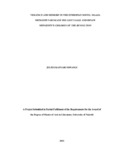| dc.description.abstract | This study explores the themes of memory and violence in Maaza Mengiste’s Beneath
the Lion’s Gaze and Dinaw Mengestu’s Children of the Revolution. The theme of violence
is discussed in the first chapter while memory is discussed in the subsequent
chapter. The study also adopts a gender perspective to violence and memory, which
constitutes my third chapter.
Therefore, the study employs theories of violence, memory and gender. Under the
theme of violence, the study is guided by the ideas of Lawrence, B. and Karim, Aisha
(On Violence), Wole Soyinka (Climate of Fear: The Quest for Dignity in a Dehumanized
World), Achille Mbembe (On the Postcolony), Antonio Gramsci (Selections from
the Prison Notebooks), and Frantz Fanon (The Wretched of the Earth). On the other
hand, my analysis of the theme of memory is majorly guided by the ideas of Felman
(1992, 206), Susan Gubar (2003), Godwin Siundu (2009) and Terrence Lyons (2006).
Lastly, my third chapter is guided by the ideas of Sara Suleri, with regard to African
feminism.
The study discusses violence as multi-directional. In as much as the military regimes
mete violence against the people, the latter responds through the use of available
forms of violence. The study therefore explores three different forms of violence including
physical, psychological and symbolic. Physical violence entails observable
harm to internal or external organs of the characters’ bodies while psychological violence
refers to mental harm. As such violence leads various characters to mental or
psychological break down. Whereas both men and women are affected by the various
forms of violence, women seem to suffer most from these acts of violence aimed at
viii
total destruction of revolting individuals or groups. However, women emerge victorious
(they acquire positions of leadership both at the family, community and national
levels) at the end of the two novels, as the men are sent to prisons, incapacitated or
even killed. The men on the other hand are emasculated as they seek to affirm their
identities as men.
Faced with these difficult experiences characters employ memory to enhance or blur
their vision and mission in the two novels. On one hand, some characters are made
better by what they remember, while on the other some are destroyed by what they
remember. In addition, the two authors recall their past differently based on their genders.
Therefore, this research is yielding with regard to the study of the themes of violence,
memory and gender in the Ethiopian literature. | en |

